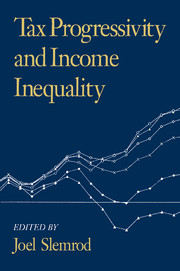Book contents
- Frontmatter
- Contents
- Preface
- List of contributors
- 1 Introduction
- 2 Trends in federal tax progressivity, 1980–93
- COMMENTS
- 3 The lifetime incidence of state and local taxes: measuring changes during the 1980s
- COMMENTS
- 4 Trends in income inequality: the impact of, and implications for, tax policy
- COMMENTS
- 5 The efficiency cost of increased progressivity
- COMMENTS
- 6 On the high-income Laffer curve
- COMMENTS
- 7 Tax progressivity and household portfolios: descriptive evidence from the Survey of Consumer Finances
- COMMENTS
- 8 Progressivity of capital gains taxation with optimal portfolio selection
- COMMENTS
- 9 Perceptions of fairness in the crucible of tax policy
- COMMENTS
- 10 Progressive taxation, equity, and tax design
- Index
COMMENTS
Published online by Cambridge University Press: 20 May 2010
- Frontmatter
- Contents
- Preface
- List of contributors
- 1 Introduction
- 2 Trends in federal tax progressivity, 1980–93
- COMMENTS
- 3 The lifetime incidence of state and local taxes: measuring changes during the 1980s
- COMMENTS
- 4 Trends in income inequality: the impact of, and implications for, tax policy
- COMMENTS
- 5 The efficiency cost of increased progressivity
- COMMENTS
- 6 On the high-income Laffer curve
- COMMENTS
- 7 Tax progressivity and household portfolios: descriptive evidence from the Survey of Consumer Finances
- COMMENTS
- 8 Progressivity of capital gains taxation with optimal portfolio selection
- COMMENTS
- 9 Perceptions of fairness in the crucible of tax policy
- COMMENTS
- 10 Progressive taxation, equity, and tax design
- Index
Summary
This paper has two parts. The first provides new empirical evidence on the pattern of capital gains realizations, both across households and over time for a given set of households. The second develops a simple multiperiod model where households divide their portfolios between a risky asset and a safe security, and uses it to analyze the welfare consequences of various capital gains tax reforms. Both sections provide interesting new insights on capital gains taxation.
The first part of the paper presents new results from a very recent data set, the 1985–89 IRS Sales of Capital Assets Panel. The findings show that most capital gains are realized by the same households, year after year. In this five-year data set, only one-fifth of all net gains were realized by households reporting gains in only one or two years. In contrast, two-thirds of all gains were reported by households with gains in at least four of the five sample years. These statistics confirm findings with similar data sets for earlier periods. Such confirmation is welcome, since the mix of capital gains has changed over time. Gains on equities became a larger share of total gains in the 1980s, while gains on real estate and other physical assets declined relative to previous decades.
The results for the 1985–89 period are also of somewhat special interest, however, because of the major change in realization incentives that was legislated in 1986.
- Type
- Chapter
- Information
- Tax Progressivity and Income Inequality , pp. 305 - 308Publisher: Cambridge University PressPrint publication year: 1994



